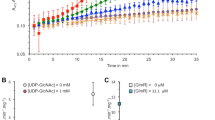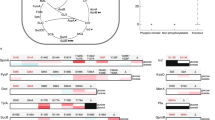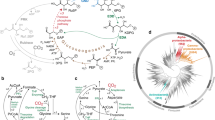Abstract
WE have described various enzymes in E. coli participating in an oxidative pathway of glucose-6-phosphate degradation via 6-phosphogluconate to pentose-5-phosphate and then to triose phosphate. Recently, we have found the specific adaptive transphosphorylases, gluconokinase1, D-arabinokinase2, and ribokinase2 in E. coli which permit the insertion of the homologous substrates into this pathway. The Embden–Meyerhof pathway of anaerobic triose formation also exists in these bacteria. These relationships are presented in the accompanying chart.
This is a preview of subscription content, access via your institution
Access options
Subscribe to this journal
Receive 51 print issues and online access
$199.00 per year
only $3.90 per issue
Buy this article
- Purchase on Springer Link
- Instant access to full article PDF
Prices may be subject to local taxes which are calculated during checkout
Similar content being viewed by others
References
Cohen, S. S., and Scott, D. B. M., Nature, 166, 781 (1950).
Cohen, S. S., Scott, D. B. M., and Lanning, M., Fed. Proc., 10, 173 (1951).
Cohen, S. S., Bact. Rev., 13, 1 (1949).
Author information
Authors and Affiliations
Rights and permissions
About this article
Cite this article
COHEN, S. Utilization of Gluconate and Glucose in Growing and Virus-infected Escherichia coli. Nature 168, 746–747 (1951). https://doi.org/10.1038/168746a0
Issue Date:
DOI: https://doi.org/10.1038/168746a0
This article is cited by
-
Correlation between hexose-monophosphate shunt, glycolytic system and fermentation-type in lactobacilli
Antonie van Leeuwenhoek (1957)
-
Cellular Control in Virus Infection
Nature (1955)
Comments
By submitting a comment you agree to abide by our Terms and Community Guidelines. If you find something abusive or that does not comply with our terms or guidelines please flag it as inappropriate.



